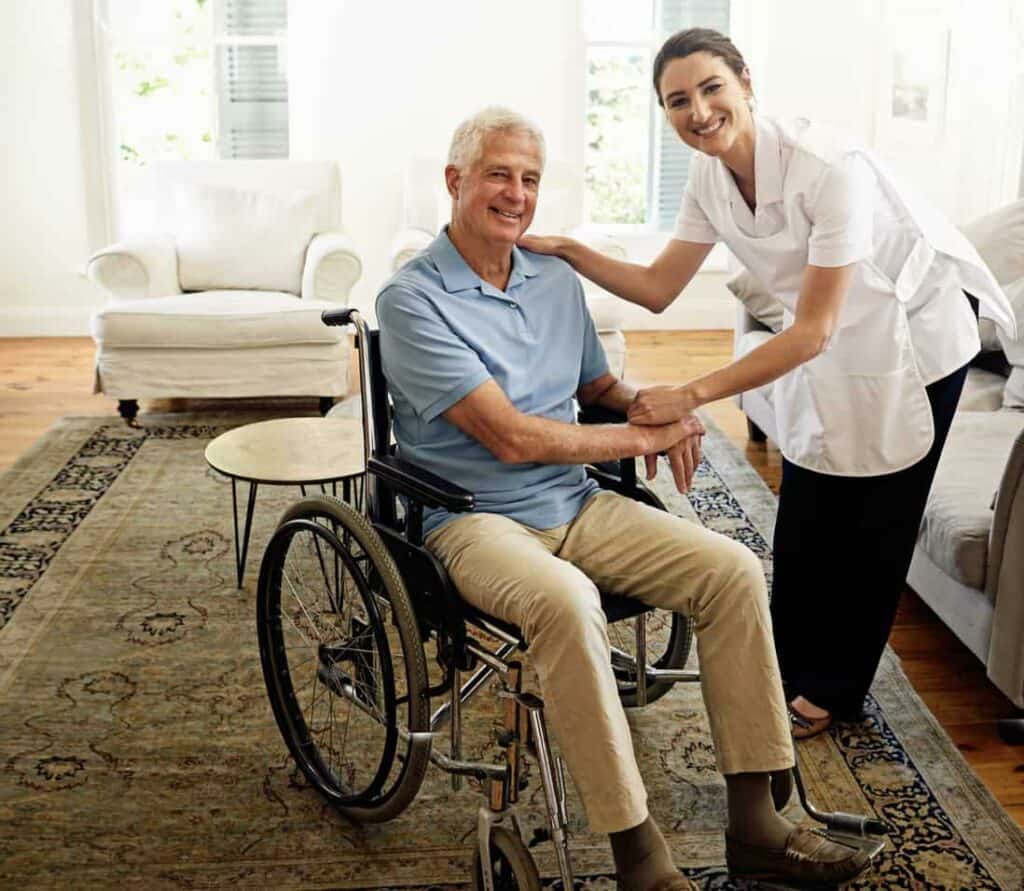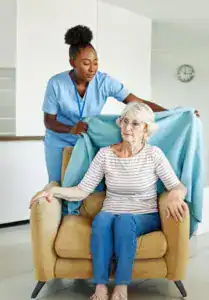
25+ Joyful Indoor Activities for Seniors That Will Transform Their Day
As seasons change in Reno and Carson City, or when mobility becomes a challenge, finding engaging indoor activities for seniors can feel like a difficult

Are you a family caregiver to your senior mom or dad living with a complex condition or an illness? Perhaps you’ve heard about in-home health care but aren’t sure what it entails or how it could benefit your family.
Caring for senior relatives can be a rewarding experience, but it also comes with ups and downs, much like a rollercoaster. As your loved ones age, their health needs become more complex, and providing for that can become overwhelming, especially if you’re a volunteer with no qualifications —- enter in-home health care. It can benefit both you and your senior loved one.
Read this article to understand in home health care services, the types of services available, and the benefits they offer. You’ll also learn tips to choose the right provider, delve into the vital role of skilled nursing, and discover how to personalize in-home health care to meet the different health demands of a relative.
Essentially, in-home health care comprises the medical and non-medical services provided to seniors in any setting they call home. Its main goal is to improve the quality of life of aging relatives and provide the care they need to sustain their independence.
Many young people have this preconception that seniors need to be taken care of all the time since they’re frail. But this is far from the truth as many seniors retire in good health and are highly capable of supporting themselves. One study on older people found that those who retire had higher ratings for mental health, relationships, and life satisfaction compared to people in the workforce. What this implies is seniors may have a healthier headspace and joyful life than others, but they might need minor help with some mobility challenges.
Now, there are different types of in-home health care services you can choose from depending on your senior loved one’s needs:

In-home health care offers many benefits for both seniors and their families. It’s beneficial if your loved one has increasing care demands and you’re busy with juggling responsibilities to meet these needs.
Staying in their own home allows seniors to remain in a comfortable, familiar environment, which can enhance their emotional well-being and sense of independence. After all, it’s where they’ve made memories and feel the most comfortable.
Imagine your elderly mom who’s lived in the same house for decades and moving abruptly to an unfamiliar facility. It can be hard to adjust, but in-home health care allows them to continue staying at home and spend their golden years joyfully with the rest of their loved ones.
One of the biggest advantages of in-home health care is the personalized care and attention seniors receive. Care plans are tailored specifically to your relative’s unique preferences and needs. This level of personalization guarantees your loved one gets the care they truly need whenever and wherever they need it. Plus, in-home health care services can evolve as your loved one’s needs change over time.
In-home health care isn’t just about providing medical care — it’s about improving your loved one’s overall quality of life by offering all-inclusive care encompassing mental, social, and physical care needs. Caregivers can provide companionship, engage seniors in activities they enjoy, and even accompany them to social outings. This holistic approach contributes to a happier and more fulfilling life for your elderly loved one.
Worried about the costs? Compared to senior living facilities or nursing homes, in-home health care is a more cost-effective option. It allows seniors to receive care without the hefty cost of institutionalized care.
The median cost of a nursing home for a private room is \$290 per day, or \$105,850 annually, depending on your state. Assisted living facilities cost $51,600 per year. On the other hand, the median cost of non-medical care in Louisiana is about $17 per hour or $38,900 per year. In states with higher costs of living, like New York, the median rate is $26 per hour, or about $59,000 a year. With in-home health care, you can receive similar levels of care at a fraction of the cost.
Selecting the right in-home healthcare provider is an important decision. If you’re unsure where to start, here are some parameters to consider.
Is the provider licensed, insured, and bonded? Start by determining the provider’s qualifications and experience. Check the qualifications and experience of their hired caregivers and nurses. A reputable provider will have a team of skilled professionals with a track record of delivering high-quality care.
What services do they offer? Do they have the specific services required by your senior loved one? Whether it’s assistance with daily activities, skilled nursing, or therapy services, identify their range of services to make sure they can address your elderly loved one’s unique care requirements.
People’s reviews and recommendations can be a powerful indicator of service quality. Read online reviews from their website or social media pages and ask for recommendations from family and friends. Look for testimonials from clients. What are they saying about the provider?
When allowing someone into your loved one’s home, trust is a crucial factor to consider. Ensure you and your senior family members feel comfortable and safe with the nurses or caregivers who will be providing care. Trust and communication are key components of a successful in-home healthcare experience.

Skilled nursing care is crucial for seniors living with complex medical conditions. If your loved one has a heart disease, diabetes, dementia, or serious injuries and needs to recuperate at home, look for a provider with care workers with the expertise and training to manage and monitor these conditions. Having a skilled nurse on the team gives you peace of mind, knowing your loved one’s health is in capable hands.
Here are some services offered by a skilled nurse:
In most cases, in-home health care involves a collaborative approach to treatment. Skilled nurses work alongside other healthcare professionals, such as doctors, therapists, and social workers, to provide comprehensive, holistic, and high-quality care. This teamwork ensures that all aspects of your senior loved one’s health are addressed.
What kind of care does your elderly loved one need? Personalized care is crucial in recovery. In-home health care can be tailored to various health situations. Here are some examples:

Have you asked yourself, “How much does in-home health care cost?” “Where do I find in-home health care providers?” These are prevalent questions people have when they start looking at in-home health care. Navigating the healthcare system can feel overwhelming as you have abundant options. If you’re unsure where to start, review these resources and support options to ease the search process.
There are multiple government programs assisting seniors who require in-home health care. These programs can vary in each state and may include Medicare, Medicaid waivers, Veterans’ benefits, and programs specifically designed to support seniors in their homes. Make sure to do your research — look for options available in your area and check if your loved one qualifies.
Many non-profits offer support and resources to help older adults thrive. Some may assist you in navigating the complexities of in-home health care and provide valuable information and support. Others may give you financial aid. Look for organizations such as AARP, the National Council on Aging, Advocates for Senior Issues, and local senior advocacy groups.
Your search for the best in-home health care is easier today because of the internet. You can find and connect with in-home health care providers on their website or social media pages. These tools allow you to search for providers in your area, read reviews, and compare services and prices. It can be a valuable tool in your quest to find the right in-home healthcare partner.

In-home health care is a versatile and compassionate option for seniors and their families looking to strike a balance between independence and quality care. With it, seniors can enjoy tailored services in comfortable and familiar surroundings and a higher quality of life. Make sure to carefully assess providers, prioritize trust and computability, and consider available resources and support.
Whether it’s managing chronic conditions, helping with post-surgery recovery, handling medical equipment, or providing specialized memory care, Amy’s Eden has highly-trained caregivers and care staff to customize care and support based on your loved one’s needs.
With the right in-home health care provider, your senior loved one can continue to thrive in comfort and live independently, with their physical, emotional, and mental health needs taken care of. Contact us today to find out how we can help.
Get care >

As seasons change in Reno and Carson City, or when mobility becomes a challenge, finding engaging indoor activities for seniors can feel like a difficult
Family Survey Please share your honest feedback to help us improve the care and safety of your loved one.
Professional Senior In-Home Care in Carson City Keep your loved one in the comfort of their cherished home. Amy’s Eden delivers exceptional senior care services

The Best Home Care in Reno, NV The comfort of your home, the quality of Eden. We provide compassionate, professional in-home care services for seniors

Amy's Eden Senior Care © 2023